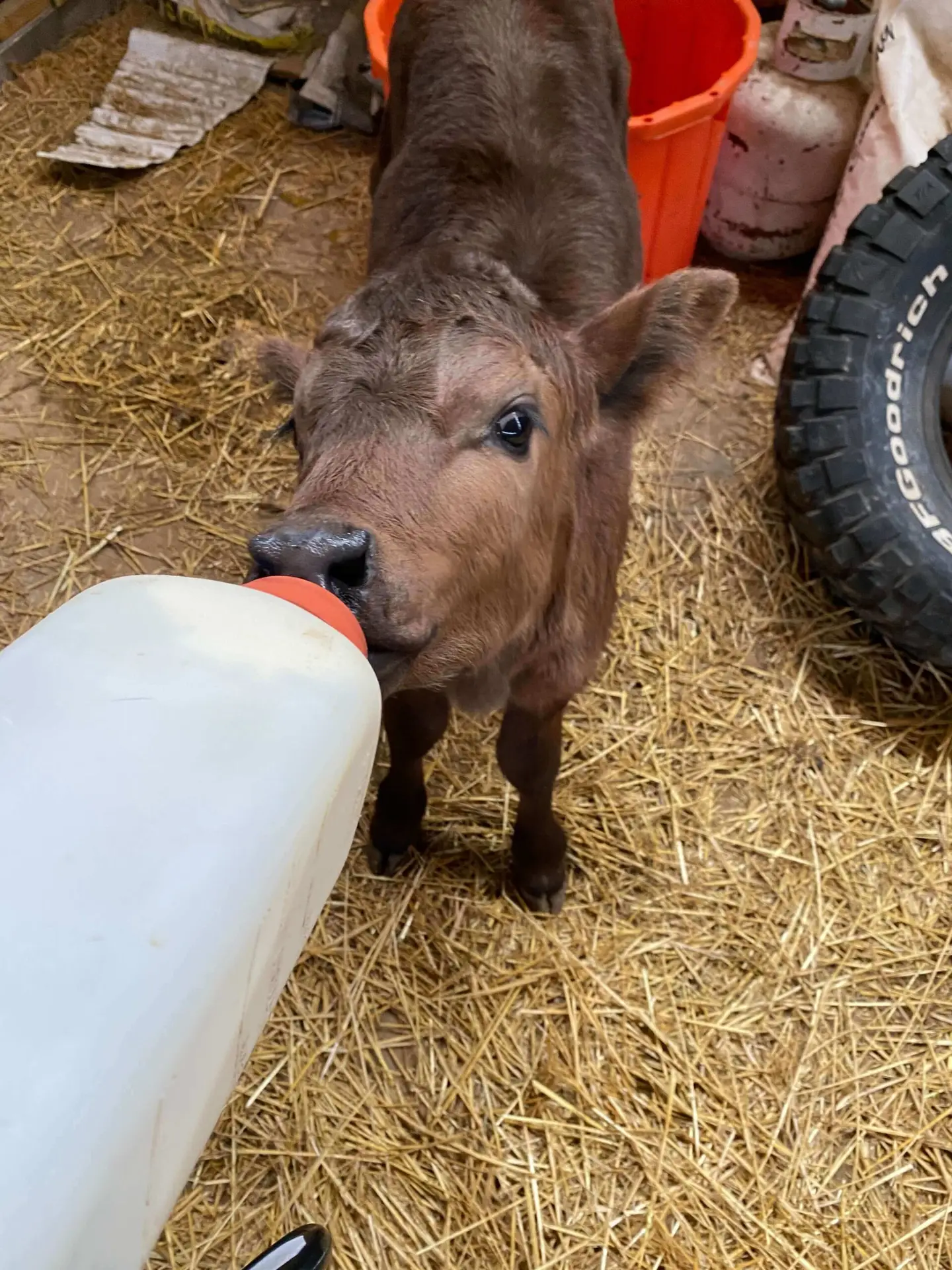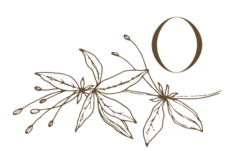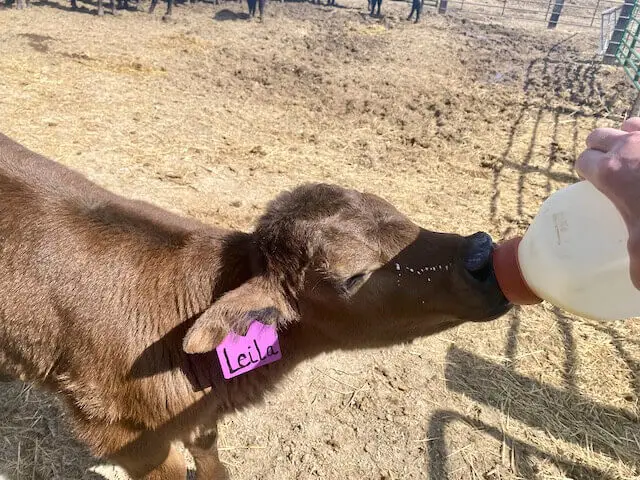Leila
The phone screen flashed with muted notifications. I flipped it over. It’s too early for texting. I need a minute or 30 this morning before I engage. I’d like to finish my coffee without the interruption of outside news.
I sipped my cup of jo, tasting the toasted flavors of Aruba caffeine.
The phone vibrated intermittently, reminding me that I hadn’t responded.
One, two, three. Buzzing.
Nagging for attention.
I caved without thinking and flipped it over.
Chance texted, “Leila just delivered.”
“What? When?” I texted back.
“This morning, about 5 AM.” Flashed another text.
“Congratulations! Boy or girl?”
“Bull.”
“In the pasture? Or barn?”
“She’s in the barn. You can come and see her.”
“I will!”
Coffee gulped down. Ouch, it’s still too hot.
“Jerry, Leila had her baby!” I said. “And it made it. She lost hers last year.”
“Are you going to see her?” He asked, looking up from his iPad.
“Yep. This morning, after it warms up a bit. Looks like last night’s rain may have greased up the dried mud.”
“Probably. We got about 2-tenths of an inch of rain. It could be messy.”
“Okay, yeah, I’ll have to wait to see her.” The rainfall dampened my anticipation. “She’s at the barn, so I won’t have to hike through the field to see her.”
Leila, the cow, is a bovine pet.
When she arrived three years ago, February 17, she could barely stand. Her mother died just after birth. Chance scooped the newborn calf, only hours old, and carried her to a dry pen in the calving barn.
She would need another cow to nurse her, but none was available.
For now, she would be a “bottle calf.” And Chance would need to feed her every four hours. He had several hundred cows all due within this calving season. The odds of this calf surviving were low without someone coming to the barn and feeding her.
As it was, the young rancher needed to ride his herds every couple of hours day and night, checking them and watching and monitoring his cows for signs of labor. Chance was born a rancher. Working solo, he was doing a job for four. It is his passion, this love of the outdoors, and caring for his ranch and invested livestock.
And so the calving season goes until the final calf arrives. Most are birthed without complications.
But then, there was Leila. Her mother was dead, and no cow to nurse her.
“Wanna bottle feed a calf?” Chance texted on that cold February morning three years ago.
“Sure, but you need to show me how.”
“I fed her this morning. She needs a bottle around 11.”
“I’ll be there.” I texted.
And so it began —my bottle-feeding this three-day-old calf. I wasn’t raised with calves to feed on a ranch or the like, but here, survival on the prairie includes neighboring — stepping in when possible.
For the first month, when I showed up at the barn, Leila was waiting for me, standing alone, with no mom to nurse her; other cows in the barn cared for their young.
I would mix the formula with warm water in a plastic quart bottle. Then, slip the orange rubber nipple the length of my thumb over the lip of the bottle and shake. In no time, Leila’s ears would hear the warm milk splash inside the bottle and come trotting to me. Instinctively, she would knock her head between my legs, trying to get milk to let down. Steadying myself against the same rail panels where she was born, I would bring the bottle down to her nose, the milk dripping from the nipple into her mouth. Her pen was our play area.
As March and April slipped by, the feedings became a normal part of my day—my time with Leila. She and I bonded, and strangely, she was a comfort to me, too.
“Bottle-fed calves don’t usually gain weight like the others.” Chance reminded me. “They’re more susceptible to disease and other stuff that will knock them down.”
Secretly, I was determined this was not to be Leila’s future. She would be a healthy calf, then a heifer in two years, carrying her first, and if we were really lucky, she would be a big, healthy cow and weigh more than 1000 pounds. At only three months, she was already looking good and nearly 100 pounds.
Usually, an orphan calf is presented to another cow to nurse. But since Leila arrived early in the calving season, no other cows were available to wet-nurse. I took the daytime feedings, and Chance took the early morning and evening shifts.
Leila and I became quick buddies.
Silly as it seems, she became my very heavy pet. We would run around the muck in the calving shed like the other calves in the yard.
Should could only join them once the other calves were weaned.
Her exercise was mine, too: jumping over piles of stray, avoiding equipment in storage, large tractors, and such.
I looked forward to joining her in the barn. I rubbed her head, scratching behind her ears, and she nuzzled my arm.
She graduated from sucking a bottle to drinking a bucket of milk and eventually a grain mixture of oats and corn.
Come the second weekend of May, Leila was branded with the spring calves after gaining several hundred pounds.
By late September, Leila joined the other young bulls and heifers already thriving on pasture grass and hay. However, she fell behind in her weight gain as she learned to graze, and she needed more grain. So, I continued to visit her, calling her in from the field.
“Leila,” I would call. It didn’t take much. Like a dog, she would come trotting toward me, licking the air, anticipating the molasses-covered oats and cake.
If she heard my trailblazer coming up the road, she would be the first to raise her head and mosey on over to my car. She would follow me up the road, knowing I might have ‘cake’ for her or some other treat in a bucket. Yes, she was a spoiled calf, gaining nicely and quite healthy.
A few other calves needed a bottle over the next couple of years but were moved onto an available nursing cow as soon as possible. Leila and I remained friends.
Two years later, Laila was in the calving shed. Mid-March was her time. As it was her first, she was under watch for delivery. Her labor was normal until the birth, and the calf needed to be pulled. She had lost her calf. Stillborn.
All these memories flooded me when I read the text: “Leila just delivered.”
She was healthy, and her young bull was healthy. All was in order.
“I’m heading to Chance’s barn,” I told Jerry, setting aside my still-hot coffee. “Leila had her baby, and it’s a bull!”

Share this post: on Facebook on LinkedIn

